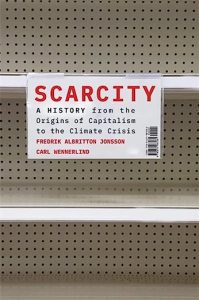In Scarcity: A History from the Origins of Capitalism to the Climate Crisis, Fredrik Albritton Jonsson and Carl Wennerlind chart the shift in humans’ relationship to nature in the West over the past 400 years, from living within its constraints to exploiting it endlessly for economic growth. This powerful and immersive book contextualises the growth mentality which has caused the climate crisis and encourages us to imagine different, sustainable ways of living, writes Emma River-Roberts.
Scarcity: A History from the Origins of Capitalism to the Climate Crisis. Fredrik Albritton Jonsson and Carl Wennerlind. Harvard University Press. 2023.
 How can learning about the past enable us to create a better future? The deleterious environmental impacts caused by economic growth necessitate a shift in how we think about nature and the economy. This rationale serves as the backdrop of Fredrik Albritton Jonsson and Carl Wennerlind’s Scarcity, which traces the history of economic thought and practice from the sixteenth century to the present day, exploring the multifarious ways that people have imagined their relationship with nature.
How can learning about the past enable us to create a better future? The deleterious environmental impacts caused by economic growth necessitate a shift in how we think about nature and the economy. This rationale serves as the backdrop of Fredrik Albritton Jonsson and Carl Wennerlind’s Scarcity, which traces the history of economic thought and practice from the sixteenth century to the present day, exploring the multifarious ways that people have imagined their relationship with nature.
The authors point out that the successful promotion of economic growth and boundless consumption is heavily rooted in dominant beliefs about nature’s scarcity – a finite resource, but one that can be perpetually substituted and improved. This conceptualisation of scarcity sits at the heart of the planetary crisis (2-3), and change is urgently needed to prevent further disastrous outcomes: growth-based economies are incapable of preventing further rises in global warming. Thus, creating an economy for the future requires ways of thinking that are both novel and radical, which the authors posit as possible via an understanding of the past (3).
The successful promotion of economic growth and boundless consumption is heavily rooted in dominant beliefs about nature’s scarcity – a finite resource, but one that can be perpetually substituted and improved.
To make sense of the different strands of thought that have emerged over time, related ideas are grouped under common rubrics. Most fall within two umbrella categories, the first of which they term “Cornucopian” ideologies – ideologies that include a series of ideas which endorse a mastery of nature and are rooted in the optimism that nature’s resources can be extended indefinitely, such as Neoclassical Scarcity (neoclassical economics). Conversely, “Finitarian” ideologies emphasise the need for constraint and moderation of people’s desires to maintain a balance between nature and the economy, such as Planetary Scarcity (5) – the understanding that the earth system can and will be overwhelmed by insatiable wants and endless economic growth (15).
Understanding that the earth system can and will be overwhelmed by insatiable wants and endless economic growth.
Rather than arising solely from the discourse of neoclassical economics, economic thinking is located within a broad, historical context, providing the reader with comprehensive coverage as to how the hegemony of growth has manifested and developed over time. Chapter Two uncovers the relationship between infinite growth and religious beliefs during the seventeenth century – it was long believed that society’s authority had been lost when Adam and Eve ate from the tree of knowledge. Yet, the advancement of arts and sciences were seen as a way to restore this presumed lost authority (46). The authors then go on to trace how the British Empire – a force innately linked with protestant evangelism – cultivated mass consumption through the novel availability of colonial goods (63-64).
The British Empire – a force innately linked with protestant evangelism – culminated in an increase of mass consumption through the novel availability of colonial goods.
Jonsson and Wennerlind’s coverage of Neoclassical Scarcity shows how it is undemocratic by design, not by accident. It was born from the desire of elites to control the populace in the nineteenth century, as British people were not content with simply enjoying more, better and cheaper goods. Conversely, they organised for greater democratic representation and improved labour conditions. This stoked genuine fears of revolution, but these progressive changes were successfully undermined through the work of neoclassical economists (173).
By purely focusing on economic factors and stipulating that everyone has an insatiable desire to consume, and that nature’s limitations could be overcome via scientific advances, attention was diverted away from ongoing political struggles for democracy and workers’ rights (174-175). An appreciation of this historical context enables the mindset that a complete abandonment of the current system is needed for any economy to ameliorate the lives of the masses within planetary boundaries.
A complete abandonment of the current system is needed for any economy to ameliorate the lives of the masses within planetary boundaries.
Throughout the book, focus is drawn towards the ways that resistance and counter-movements emerged in response to different Cornucopian and Finitarian ideologies. These behaviours are characteristic of Planetary Scarcity, which the authors discuss in Chapter Eight. Following the discovery that human waste was overwhelming the cycles which kept the planet habitable and hospitable, scientists and social critics raised the alarm on the effects of growth (206-207). Yet these fell – and continue to fall – on deaf ears. Motivated by profitability and the ideology of growth, economists and politicians continue to downplay the risks of climate change and the need for radical action (228-229).
Primarily focusing on Western thinkers was a conscious decision on the authors’ part, and they acknowledge that Scarcity has explored a narrow range of white, male thinkers as a result. The authors justify this omission with the claim that other scholars are better suited to write about the ways non-Western opposition has manifested and continues to manifest. (18) However, these omissions did somewhat of a disservice to the book. It would have been fruitful to delve into the resistances that emerged from the global South in greater depth and to highlight the integral role played by the Environmental Justice movement in challenging Cornucopian ideologies. Jonsson and Wennerlind show how the ideology of Planetary Scarcity permeated from scientific circles and grassroots movements into mainstream priorities in public opinion and governance across the globe, (225) something that the Global South played an essential role in, as well as spotlighting the Global North’s dominant extractive relationship with the Global South. A more nuanced understanding of these developments would have enabled the reader to appreciate the role played by non-Western thinkers in bringing these issues to the fore and the transnational solidarities that have developed as a result.
The integral role played by the Environmental Justice movement in challenging Cornucopian ideologies.
Scarcity was intentionally written to be accessible to those unfamiliar with the topics covered. Yet even for those better acquainted with these concepts, it remains a powerful and immersive read. By locating economic thinking, counter-movements and resistance in a broad historical context, Jonsson and Wennerlind show that while inciting progressive change has never been easy, nor will it ever be, it has been achieved before – and there is every reason to believe that we can achieve it again.
Note: This review gives the views of the author, and not the position of the LSE Review of Books blog, or of the London School of Economics and Political Science. The LSE RB blog may receive a small commission if you choose to make a purchase through the above Amazon affiliate link. This is entirely independent of the coverage of the book on LSE Review of Books.
Main Image: Evgeny_V on Shutterstock.






